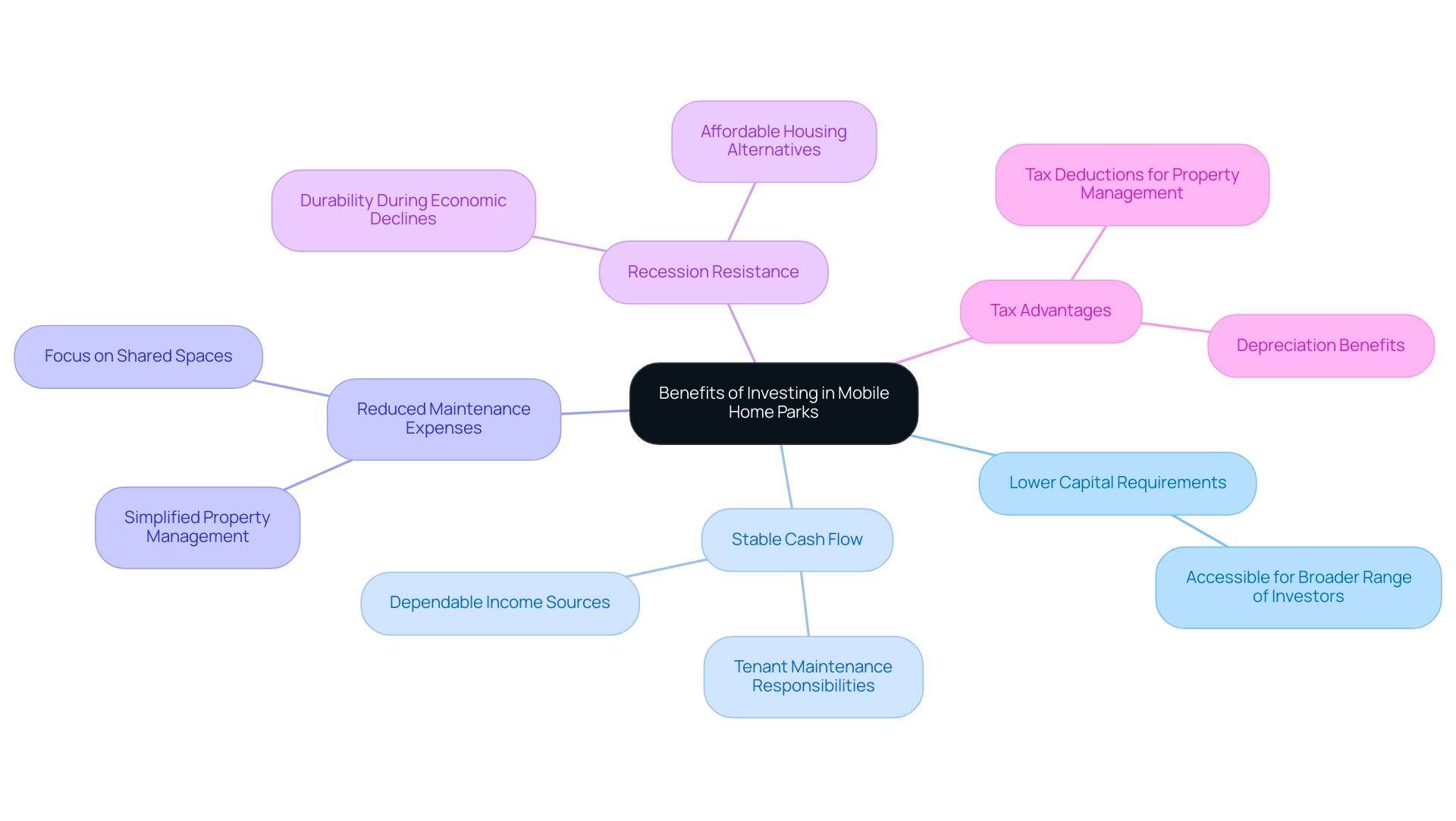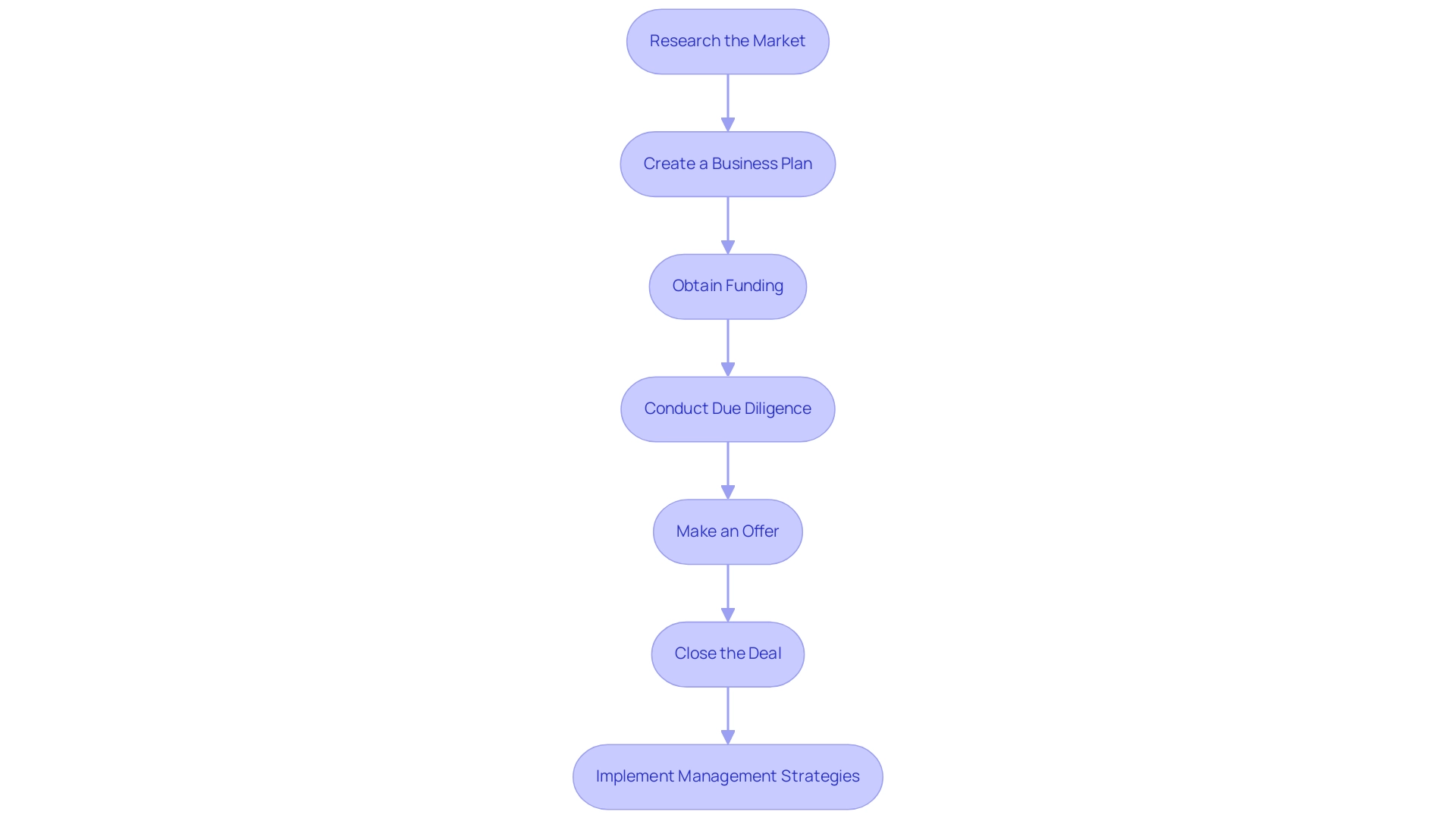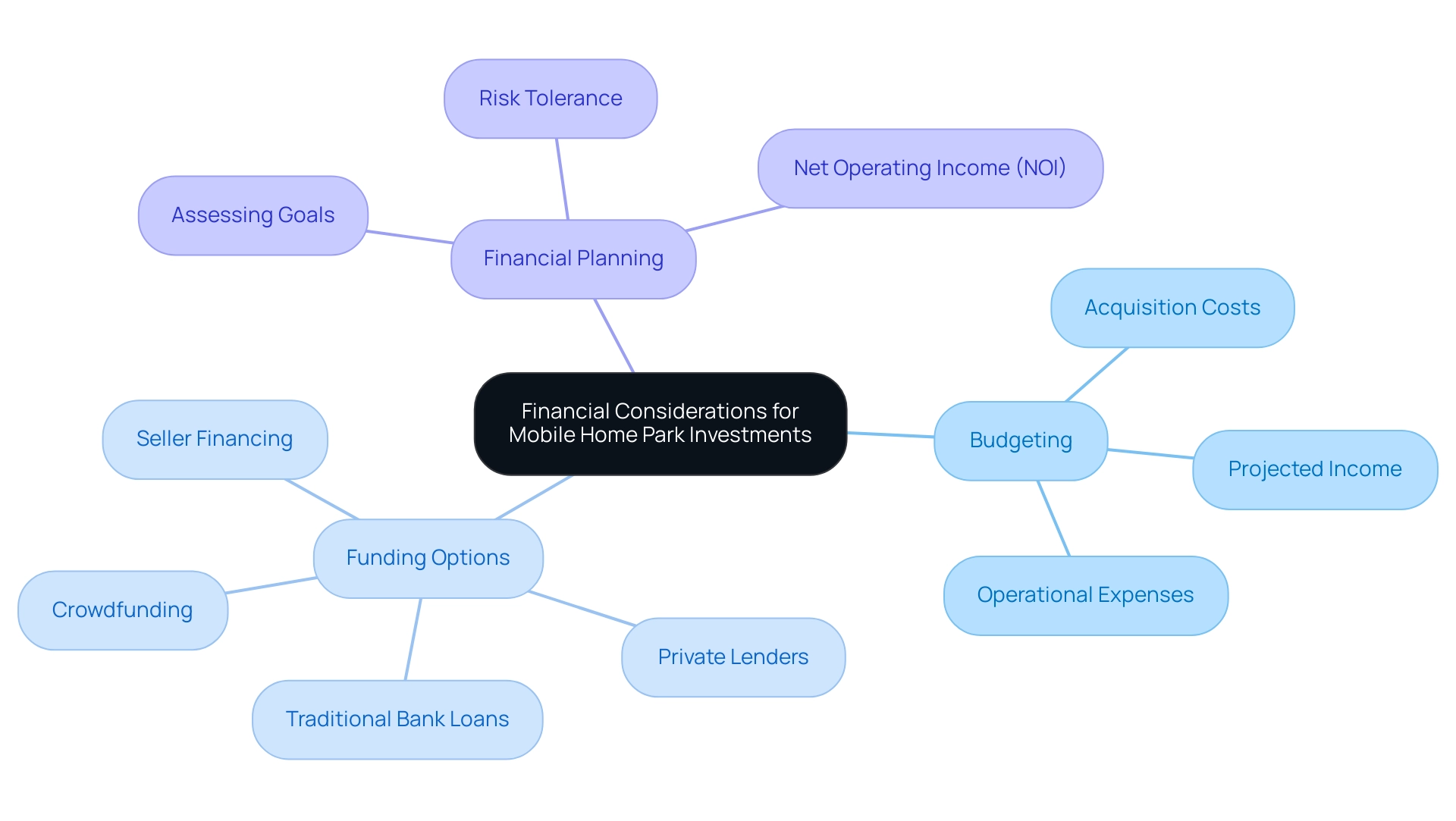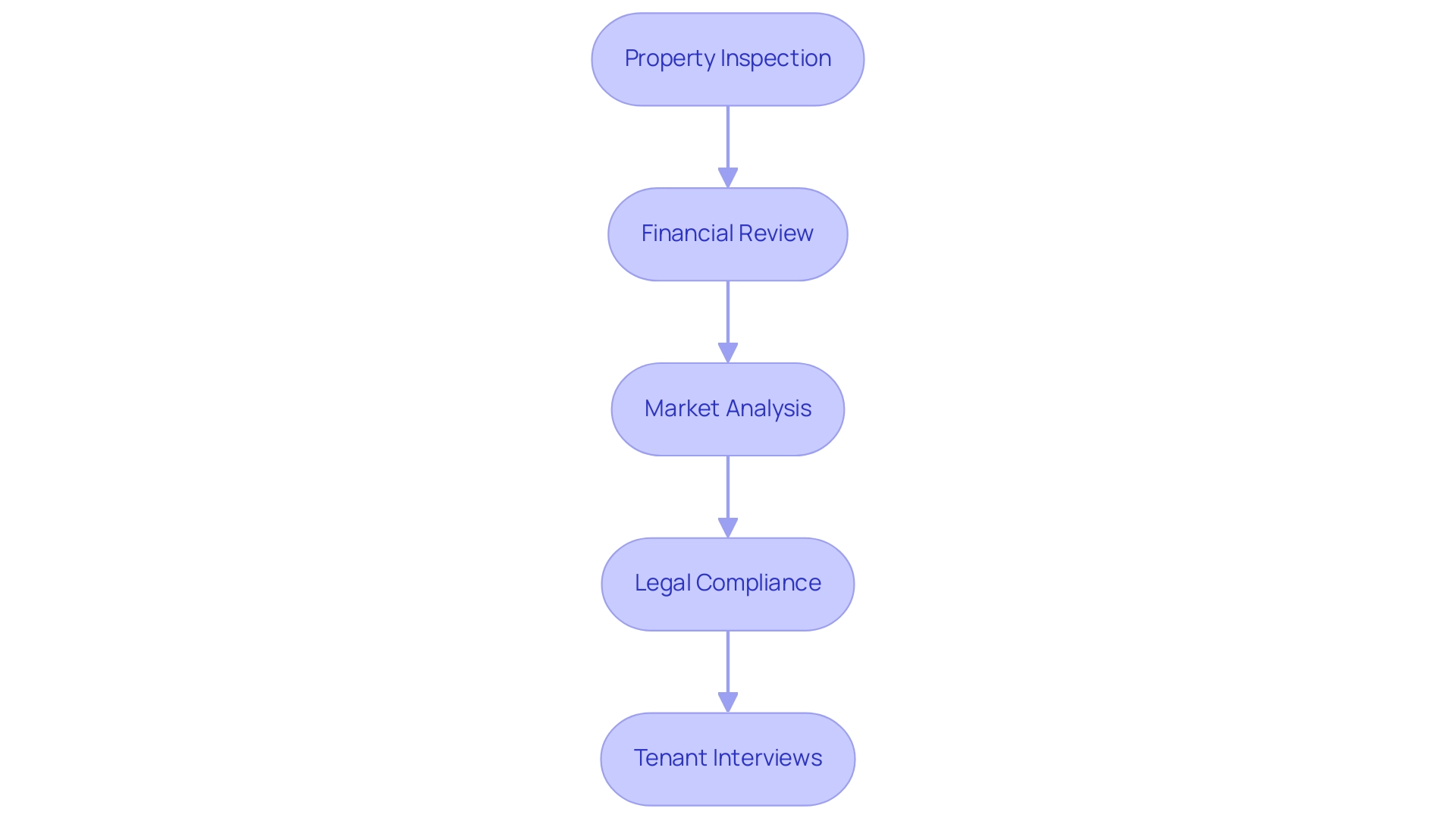Overview
Mobile home park investing can be initiated through a structured approach that encompasses:
- Market research
- The creation of a comprehensive business plan
- Securing funding
- Conducting thorough due diligence
- Implementing effective management strategies
This investment strategy is appealing due to its lower capital requirements, stable cash flow, and the increasing demand for affordable housing. These factors position mobile home parks as a unique opportunity within the real estate market, making it essential for investors to consider this avenue seriously.
Introduction
In a world where affordable housing is increasingly scarce, mobile home park investing emerges as a beacon of opportunity for savvy investors. This unique asset class not only offers lower entry costs but also promises stable cash flow and resilience against economic downturns. As demand for affordable living options continues to rise, understanding the intricacies of mobile home park investments becomes crucial.
From navigating regulatory challenges to implementing effective management strategies, investors can unlock significant potential in this niche market. With the right insights and approaches, mobile home parks represent not just a viable investment, but a strategic move in the evolving landscape of real estate.
Understanding Mobile Home Park Investing
Investing in mobile home parks involves acquiring land where trailers are situated, allowing investors to lease the land to occupants who own their homes. This financial model typically generates income through lot rents, ensuring a steady cash flow. In 2025, the average cash flow from manufactured housing communities is anticipated to remain robust, with many investors reporting returns that significantly surpass traditional real estate opportunities.
The lower entry costs associated with mobile home park investing make it an attractive option for individuals seeking to enter the real estate market, especially in a landscape where affordable housing is in high demand.
Manufactured homes constitute less than 1% of housing inventory in major markets, highlighting their rarity and essential role as an asset class. This scarcity, combined with the increasing demand for economical housing, positions mobile home park investing as a unique opportunity for capital. For example, Three Pillar Communities, a California-based company, manages over 75 manufactured housing communities across 13 states.
Their co-founder emphasizes that recognizing the value of manufactured housing can lead to substantial returns, as mobile home park investing represents a strategic opportunity within the housing market. This aligns with insights from Zero Flux, which compiles 5-12 selected real estate observations daily, ensuring that investors remain informed about market dynamics.
Successful mobile home park investing often hinges on effective community management and fostering positive tenant relationships. Tristan Hunter, an expert in the field, expresses his enthusiasm for the manufactured housing asset class, focusing on affordable housing and sustainability. Investors must adeptly navigate tenant dynamics, as these interactions can significantly influence occupancy rates and overall profitability.
Expert opinions suggest that maintaining open lines of communication and promptly addressing tenant concerns can enhance community satisfaction and retention.
As the landscape of mobile home park investing evolves, staying abreast of the latest trends and challenges is crucial. Investors should be mindful of potential issues such as depreciation and financing obstacles, which can impact long-term returns. Nevertheless, with a strategic approach and a focus on the unique benefits of this asset class, mobile home park investing can represent a prudent financial decision in today’s real estate market.
Benefits of Investing in Mobile Home Parks
Investing in mobile home parks presents a range of compelling advantages that make it an attractive option for real estate investors.
- Lower Capital Requirements: Mobile home parks typically demand a smaller initial investment compared to single-family homes or commercial properties, making them accessible for a broader range of investors.
- Stable Cash Flow: The steady demand for economical housing guarantees that mobile communities can produce dependable income sources. This stability is further supported by the fact that tenants are responsible for maintaining their own residences, significantly reducing the owner's maintenance obligations and associated costs.
- Reduced Maintenance Expenses: With occupants overseeing their own residences, property owners can concentrate on maintaining shared spaces and utilities, resulting in decreased overall maintenance expenses. This arrangement not only enhances cash flow but also simplifies property management.
- Recession Resistance: Mobile residential communities have shown durability during economic declines, as they offer crucial affordable housing alternatives. This characteristic makes them a stable option, even in challenging economic climates.
- Tax Advantages: Investors can utilize different tax deductions associated with property management and depreciation, further increasing the financial attractiveness of residential community ventures.
Recent insights from the Southland Mobile Home Community operator highlight strategies for maximizing value, such as reducing bloated operating costs, raising below-market lot rents, passing water and sewer costs to tenants, and increasing occupancy by utilizing vacant lots. Furthermore, Alabama's investor-friendly zoning laws and low property tax rates enhance profit margins for trailer community owners, rendering it an even more appealing market.
In 2025, the advantages of mobile home park investing are emphasized by property analysts who stress the potential for consistent cash flow and the benefits of reduced initial outlays in comparison to conventional real estate choices. As the market keeps changing, mobile home park investing remains a practical and profitable opportunity for individuals looking to broaden their portfolios. As Ethan observed, "Inherent in the act of allocating resources is engagement with the capitalist system," highlighting the motivations behind such choices.
Additionally, with more than 30,000 subscribers depending on Zero Flux's data-oriented method for real estate market analysis, the information provided here is supported by a trustworthy source, enhancing the significance of manufactured housing ventures.

Challenges and Risks in Mobile Home Park Investing
Investing in mobile home parks can indeed be lucrative, yet it is essential to recognize the various challenges that accompany this venture.
- Regulatory Compliance: Navigating local zoning laws and regulations is crucial, as these can differ significantly from one jurisdiction to another. Investors must stay updated on any changes that could affect their operations, as non-compliance can lead to costly penalties.
- Tenant Management: Managing relationships with tenants can be intricate, particularly in communities with diverse demographics. Understanding tenant needs and fostering a positive community atmosphere is vital for tenant retention and satisfaction. As Tristan Hunter, an expert in investor relations, notes, "If rents seem much higher than average without justifying reasons, attracting and retaining tenants might become more challenging." This emphasizes the necessity for a comprehensive grasp of market dynamics and tenant expectations to guarantee successful investments in residential communities.
- Market Volatility: Economic fluctuations can directly influence occupancy rates and rental income. Investors should examine vacancy rates and rental trends particular to trailer communities to foresee market changes and modify their strategies accordingly. For instance, the retail sector is currently facing challenges, with many shopping malls operating at a staggering 50% vacancy rate. This market fluctuation could indirectly influence nearby trailer communities, making it crucial for investors to stay alert regarding wider economic indicators.
- Infrastructure Maintenance: Investors bear the responsibility for maintaining common areas and utilities, which can lead to unexpected expenses. Regular assessments and proactive maintenance strategies are essential to mitigate these costs and ensure a safe living environment for tenants.
- Funding Challenges: Obtaining funding for manufactured housing communities frequently poses greater difficulties than conventional real estate opportunities. Lenders may perceive these properties as higher risk, making it crucial for investors to present a solid business plan and demonstrate the potential for stable returns.
Considering these challenges, it is wise for investors to combine various elements when assessing a manufactured housing opportunity. A case study titled "Final Considerations Before Making a Mobile Home Park Investing Decision" emphasizes the importance of considering location, tenant stability, and property conditions. The research suggests that by seeking advice from experts and examining various data sources, investors can make better-informed choices related to their holdings in trailer communities.
It is important to note that the information provided is for informational purposes only and does not constitute financial advice or guarantees of profitability.
Step-by-Step Process to Start Investing
To embark on a successful journey in mobile home park investing, consider the following structured approach:
- Research the Market: Begin by identifying regions with a robust demand for affordable housing. Florida, for instance, is experiencing significant population growth, with forecasts indicating an increase of over 300,000 residents annually for the next decade. This trend emphasizes the need for cost-effective housing options, making mobile home park investing a key focus for trailer community funding.
- Create a Business Plan: Develop a comprehensive business plan that outlines your funding strategy. This should include detailed financial projections, management plans, and a clear vision of your goals. Successful investors emphasize the importance of a well-structured plan to navigate the complexities of the market. As Tristan Hunter, a specialist in investor relations, observes, "A robust business plan is essential for concentrating on affordable housing and sustainability in trailer community funding."
- Obtain Funding: Explore different financial options accessible for trailer court acquisitions. Options may include traditional loans, private investors, or partnerships. The typical duration to obtain funding in 2025 is anticipated to be approximately 30 to 60 days, so plan accordingly to avoid delays in your timeline.
- Conduct Due Diligence: Perform thorough due diligence on potential properties. This includes reviewing financial records, occupancy rates, and the condition of infrastructure. A case study in Tampa, Florida, illustrates the importance of this step; the area saw a 1.9% population growth in 2023, driving demand for mobile home park investing. Assessing these factors can help guarantee a solid financial commitment.
- Make an Offer: After identifying a suitable property, submit a competitive offer. Be ready to negotiate terms with the seller, keeping your financial strategy in mind.
- Close the Deal: Finalize the purchase by ensuring all legal and financial documents are meticulously organized. This step is crucial to avoid any potential pitfalls post-acquisition.
- Implement Management Strategies: Once the property is acquired, develop effective management strategies. This includes establishing strong tenant relations and implementing maintenance protocols to enhance property value and tenant satisfaction.
By adhering to these steps, investors can efficiently maneuver the manufactured housing sector through mobile home park investing, utilizing Florida's advantageous regulatory framework and steady population increase to optimize their financial potential. Zero Flux's commitment to data integrity and sourcing information from credible outlets ensures that the insights provided in this guide are reliable and actionable.

Financial Considerations and Funding Options
When embarking on mobile home park investments, it is crucial to consider several financial aspects to ensure a successful venture.
Budgeting: Developing a comprehensive budget is essential. This budget should encompass acquisition costs, ongoing operational expenses, and projected income. It must include not only the purchase price but also costs related to maintenance, utilities, and property management. This approach allows for a clearer picture of potential profitability.
Funding Options: Exploring a range of funding sources is vital to support your financial endeavor. Options include:
- Traditional bank loans, which often offer competitive interest rates for qualified borrowers.
- Private lenders, who may provide more flexible terms and quicker access to funds.
- Crowdfunding platforms, which allow multiple investors to pool resources for larger projects.
- Seller financing, where the seller acts as the lender, potentially easing the acquisition process.
Financial Planning: Assessing your financial goals and risk tolerance is necessary to determine the most appropriate strategy for allocating resources. Collaborating with a financial advisor can help you create a robust investment plan that aligns with your goals. This includes understanding the Net Operating Income (NOI), which is calculated by estimating actual income and deducting anticipated operating expenses, excluding mortgage interest and depreciation.
In 2025, the average acquisition expenses for manufactured dwelling parks have experienced significant variations, shaped by market dynamics and regional trends. For instance, in Indiana, the average sales price of new manufactured residences surged by 62.20%, reflecting a broader trend in the market. This rise is part of a broader scenario where the total transaction value of properties sold on MHVillage in 2016 surpassed $2.5 billion, suggesting a strong market for manufactured residences.
However, as John Oliver highlighted, "Mobile residences may appear to be a cost-effective housing choice, but large capital firms are making them increasingly unaffordable." This statement underscores the challenges investors face in maintaining affordability in the market.
Additionally, grasping the systematic method for assessing trailer community investments, as described by Dave Reynolds, is crucial. He emphasizes the importance of understanding occupancy rates, lot rents, and expenses, introducing a valuation method based on these factors. By incorporating these financial factors and funding alternatives, investors can efficiently manage the intricacies of mobile home park investing.

Conducting Due Diligence and Market Research
Conducting due diligence in mobile home park investing is crucial for making informed decisions and minimizing risks. This process encompasses several essential steps that every investor must consider:
- Property Inspection: A thorough assessment of the area's physical condition is vital. This includes evaluating the infrastructure, utilities, and common areas to identify any potential issues that could affect the property's value or tenant satisfaction.
- Financial Review: Analyzing financial documents is key to understanding the area's profitability. Investors should scrutinize profit and loss statements, rent rolls, and expense reports to gauge the financial health of the investment and forecast future performance.
- Market Analysis: Researching local market trends is essential for identifying opportunities and risks. This involves examining occupancy rates, projected to remain stable in 2025, and analyzing rental prices and demographic shifts that could impact demand for mobile homes.
- Legal Compliance: Ensuring that the property adheres to local zoning laws and regulations is critical. Non-compliance can lead to costly legal issues and hinder the facility's operational capabilities.
- Tenant Interviews: Engaging with current tenants can provide invaluable insights into the community's dynamics. Understanding tenant satisfaction levels can help investors evaluate the property's reputation and identify areas for improvement.
In 2025, the significance of property evaluations cannot be overstated, especially as only 14% of buyers have waived inspections, the lowest percentage in five years. This statistic underscores the importance of comprehensive assessments in the residential community sector. Furthermore, perspectives from experienced real estate experts highlight the necessity for thorough market analysis to manage the intricacies of mobile home park investing ventures efficiently.
Floyd Pirak, COO of Homes Direct, observes, "Grasping the subtleties of due diligence can greatly influence the success of your mobile home park investing." Additionally, the case study on limited appreciation potential emphasizes that while mobile homes are generally not regarded as long-term appreciating assets, mobile home park investing in the land can result in property value appreciation. Enhancements to mobile home communities can attract higher-paying tenants. By following these steps, investors can enhance their decision-making process and position themselves for success in this unique segment of the real estate market.

Effective Property Management Strategies
- Establish Clear Policies: Develop comprehensive rules and regulations that are clearly communicated to tenants. This fosters a sense of community and ensures that everyone understands their responsibilities, contributing to a harmonious living environment.
- Regular Maintenance: Implement a proactive maintenance schedule for common areas and infrastructure. Regular upkeep not only preserves property value but also enhances tenant satisfaction, as a well-maintained environment is crucial for attracting and retaining residents. However, challenges in infrastructure maintenance can arise, making it essential to prioritize these efforts to meet tenant expectations.
- Tenant Relations: Cultivate strong relationships with tenants through open lines of communication and responsiveness to their needs. Successful managers emphasize the importance of being approachable and addressing tenant concerns promptly, which can significantly improve tenant satisfaction rates. As consumer preferences shift towards community-oriented living spaces, fostering a sense of belonging becomes increasingly important.
- Financial Management: Maintain meticulous financial records and conduct regular reviews of income and expenses. This practice is essential for ensuring profitability and making informed decisions about future investments and improvements. With only 13% of property management companies earning over $1 million annually, effective financial strategies are crucial for sustainability.
- Marketing: Actively advertise the residential community to draw in new occupants. Highlighting amenities and community features can differentiate your facility in a competitive market. Effective marketing strategies are crucial for growth and sustainability, especially in light of the evolving preferences of potential residents.
- Leverage Technology: As the property management industry evolves, consider adopting automated systems for lease management and tenant communications. With 48% of firms already utilizing such technologies, embracing digital solutions can streamline operations and enhance tenant experiences. The case study titled "Future Predictions for Property Management" indicates that the industry is expected to undergo transformative changes, making technology adoption increasingly relevant.
- Stay Informed on Trends: Keep abreast of industry trends, such as the growing preference for community-oriented living spaces and the impact of remote work on location choices. Understanding these dynamics can help tailor your management strategies to meet the evolving needs of tenants in 2025 and beyond. As noted by David Bitton, job growth in 2025 saw an increase of 14,897 positions, marking a 1.73% rise from the previous year, which may influence housing demands and preferences.
Future Trends and Opportunities in Mobile Home Park Investing
The mobile home park industry is currently witnessing several significant trends that are shaping its future.
- Increased Demand for Affordable Housing: As housing costs continue to rise, mobile home parks are emerging as a viable solution for many families seeking affordable living options. In 2025, the demand for affordable housing is projected to remain high, driven by demographic shifts and economic pressures. For instance, Florida's population grew by 1.9% in 2023, highlighting the increasing need for accessible housing solutions in rapidly growing areas.
- Technological Advancements: The integration of technology in property management and tenant services is becoming more prevalent. Innovations like online rent payment systems and maintenance request platforms are boosting operational efficiency and enhancing tenant satisfaction, making residential areas more attractive to both investors and occupants.
- Sustainability Initiatives: Investors are increasingly prioritizing eco-friendly practices within residential communities. This includes the implementation of energy-efficient utilities and eco-friendly community features, which not only reduce operational costs but also attract environmentally conscious tenants. The focus on sustainability aligns with broader trends in real estate, where eco-friendly developments are gaining traction.
- Institutional Investment: The involvement of institutional investors in the residential lot market is transforming the environment. These investors bring substantial capital and expertise, enabling the acquisition and improvement of existing properties. Companies such as Havenpark are planning substantial contributions to their current portfolios, which is expected to enhance the quality and appeal of mobile home communities. Additionally, the Keel Team specializes in acquiring and enhancing value-add, mom & pop owned trailer sites, showcasing a targeted approach within the market.
- Regulatory Changes: Staying informed about evolving housing regulations is essential for navigating the investment landscape. Regulatory changes can impact everything from zoning laws to tenant rights, making it crucial for investors to remain vigilant and adaptable.
These trends not only emphasize the opportunities within the residential lot market but also highlight the significance of strategic planning and informed decision-making for potential investors in mobile home park investing. As Daniel Weisfield, Co-Founder of Three Pillar Communities, notes, "Those who get it are highly thesis-driven. They look at all overall housing supply and demand.
They look at how much manufactured housing residents love the product. They look at manufactured housing rents on a continuum with apartment rents, and they therefore see MHCs as rare assets that rightfully command premium prices." This perspective reinforces the value of understanding the dynamics at play in mobile home park investing.
Conclusion
Investing in mobile home parks offers a compelling opportunity for those keen to navigate the complexities of the real estate market. The unique blend of lower entry costs, stable cash flow, and resilience against economic fluctuations positions mobile home parks as an attractive asset class for savvy investors. Understanding the nuances of this investment type—ranging from effective property management strategies to thorough market research and due diligence—is essential for maximizing returns.
The advantages of mobile home park investing, including lower capital requirements and reduced maintenance obligations, further enhance their appeal for both new and seasoned investors. However, it is crucial to remain vigilant about potential challenges, such as regulatory compliance and tenant management, which can significantly impact overall profitability. By adopting a strategic approach and staying informed of market trends, investors can effectively mitigate risks and capitalize on the growing demand for affordable housing.
Ultimately, the landscape of mobile home park investing is ripe with potential. As the demand for affordable living options continues to rise, alongside technological advancements and sustainability initiatives, the future of mobile home parks appears promising. Investors who recognize and adapt to these trends will not only secure their financial futures but also contribute to addressing the pressing need for affordable housing solutions in communities across the country.




